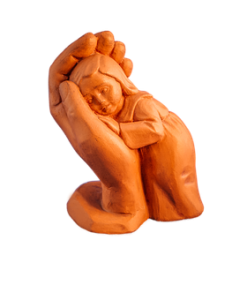

Why is there so much suffering in the world, why does God allow it, Children die, wars, famines, diseases etc. happen? Can that be a merciful God, making such things happen? Would he not have to intervene to prevent this or punish the guilty at the same time? Sometimes we would like to have God strike at once and put an end to all misery. But where should he start, where to stop? I mean, it’s good that he does not, because I’m sure none of us (myself included) would get away with it. In Psalm 53: 4, God’s judgment tells us, „But they have all fallen away and all been corrupted; There is no one who does good, not even one. „Nevertheless, the question remains as to why, and many questions remain unanswered, questions that are so often asked. No one leaves them cold, and often comes the statement: „I can not believe in such a god.“ It is quite understandable to think so. Especially when you are in such a situation where everything seems to break over you and despair has seized you, it’s hard to avoid it. „God, where are you?“, One then just wants to scream.
I would like to try to find an answer here, although I know that this is a very daring endeavor. Such an answer can never take a position on a particular situation, that would be very presumptuous and would increase the suffering of those affected even further.
In many places in the Bible, Jesus makes it clear that personal suffering does not necessarily have anything to do with one’s own guilt. For example, in Luke 13: 4 There can be many causes, and seldom do we find an answer. Therefore, we must be careful not to give hasty answers to the question of personal suffering. If we look at our siblings persecuted for their faith’s sake, we must also say: There is also suffering that serves to glorify God. I say that with a trembling heart; but it is precisely because of this that countless people have become children of God and where, if not here, the apostle Paul’s statement applies more:
„For I reckon that the sufferings of this present time are not worthy to be compared with the glory which shall be revealed in us.“ Rom 8.18
Rich wages await those who suffer because of their faith.
When the friends of Job, the great suffering man in the Old Testament, accused him of being responsible for his misfortune because he had allegedly violated God’s law, they were rebuked by God Himself and had to apologize for their behavior (Job 42: 7).
This is all about the question of where all the suffering basically comes from, and there the Bible gives a very clear answer.

When God created the world, he wanted to create in man a „counterpart“ (Genesis 1, 27) with whom he wanted communion. In order to make that possible, he gave them a free will, with which they could decide for or against him, because you can not really exchange with puppets. The visible sign of this freedom was the „Tree of Knowledge of Good and Evil“ that he had planted in the Garden of Eden. Of all the trees they were allowed to eat except from this tree: „for in the day that thou eatest thereof thou shalt surely die (Genesis 2:17),“ he said to you. It was, so to speak, the tree of choice for or against God.
In Genesis 3 we are told how first Eve and then Adam decided to eat from this tree, contrary to the warning of God. With this they had succumbed to spiritual death, illness, hardship, misery and finally physical death were the consequences and they were banished from the garden of Eden. The separation from God was there.
Now, one must know that there are two kinds of death with God: bodily and spiritual death. (1) We all know physical death; Spiritual death means to have died for God, to be separated from Him forever. God lets us go our own ways as we want. This path inevitably leads to eternal damnation „Where their worm dieth not, and the fire is not quenched.“ (Mark 9:48)
If someone is dead, he can no longer bear witness to life. It’s the same here. Adam and Eve can still bear physical life, but no spiritual life. Thus, all of their offspring are without exception spiritually dead and thus separated from God and that brings illness, suffering and pain with them (2). This applies to the present day for the whole of creation (humanity, fauna and flora). We are talking about a „fallen creation“. That’s why Jesus Christ became man as we are. He could not stand it. That’s why he came to bear our own guilt and save us. He shakes our hands. When we seize them, we receive again a new spiritual life from him, and thus come back into communion with God the Father. But more here.
Now God, as our Creator, is at the same time the one who has created our basis of life and wants to take care of us. Of course, as long as we live detached from him, we do not heed his will, we do not know him at all; and so it happens that in our lives many things are different than those planned by our God. We know that from the technical devices. Whenever we have bought one, there is an instruction manual which should protect the device and also us from damage. But it can only do that if you pay attention to it. God’s instruction for us is the Bible. He gave it to us to protect us from harm. But because we do not pay attention to them, so many things get out of hand and both we and our environment suffer damage. Distress, suffering and tears are the result, until today.
Today we live in this „fallen“ creation with all that this implies in consequences. This will not change until we live again in direct communion with the Father in heaven. But when we take the hand of Jesus, he is with us in all our needs. He has promised that, and that is the experience of all followers of Jesus until today.
|
Paul Gerhard:
1. Entrust your way
and what grieves your heart to the most faithful care of him who governs heaven! He who gives to the clouds, air and winds their way,course and path will also find a way where your feet can go. 2. In the Lord you must trust,
if you are to prosper; you must look to his work, if your work is to stand firm. God undertakes nothing through the cares, grief and pain you have for yourself, he must be entreated in prayer. 3. Your eternal faith and mercy,
O Father, knows and sees what is good or harmful for the mortal race; and what you have chosen you promote, mighty hero, and you bring to life and existence what pleases your wisdom. 4.In all ways you have a way,
you never lack the means; your action is pure blessing, your way is pure light, no one can hinder what you do, your activity never has to rest, when you want to do what is beneficial for your children. 5.And even if all the devils
wanted here to withstand him, there is still no doubt that God will not give way. What he has undertaken and what he wants to have must in the end come to his purpose and goal. 6.Hope, o you poor soul,
hope and be undismayed! Out of the pit where anxiety torments you in his great mercy God will extricate you. Just wait for the time, then you will indeed behold the sun of the most beautiful joy. 7. Up, up, and to your sorrows
and cares bid goodnight ! Let go of what makes your heart troubled and mournful. You are certainly not the governor who has to control everything. God sits in government and controls everything well. 8. Let him, let him act and choose,
he is a wise prince and will act in such a way that you will be amazed when he, as is his nature, with wonderful wisdom inds a solution to the things that troubled you. 9. He will indeed for a while
delay with his consolation and act by himself as if he intended to give you up and you had for ever to be suspended in anxiety and distress and he had no concern for you, 10. But if it turns out
that you keep your faith in him, then he will deliver you when you least believe he will; he will set free your heart from the burden so heavy that you have borne up till now to no ill end. 11. What happiness is yours, you faithful child!
With glory and shouts of thanks you have and bear the victory and crown of honour. God himself places the palm in your right hand and you sing joyful psalms to him who ended your suffering 12. Make an end, O Lord, make an end
of all our distress, strengthen our feet and hands and until our death at all times let us feel your care and faithfulness, and so go on our way with confidence to heaven. English Translation by Francis Browne (January 2006)
Contributed by Francis Browne (January 2006) 1. What a Friend we have in Jesus,
All our sins and griefs to bear! What a privilege to carry Everything to God in prayer! O what peace we often forfeit, O what needless pain we bear, All because we do not carry Everything to God in prayer!
2. Have we trials and temptations?
Is there trouble anywhere? We should never be discouraged, Take it to the Lord in prayer. Can we find a friend so faithful Who will all our sorrows share? Jesus knows our every weakness, Take it to the Lord in prayer.
3. Are we weak and heavy-laden,
Cumbered with a load of care? Precious Savior, still our refuge— Take it to the Lord in prayer; Do thy friends despise, forsake thee? Take it to the Lord in prayer; In His arms He’ll take and shield thee, Thou wilt find a solace there.  |
To our life belong not only joy, friendship, love and good times. No, often we also suffer from deep suffering, despair, pain and other things that make life difficult for us. Worries want to depress us and rob us of sleep.
The Apostle Peter tells you in the name of Jesus Christ (1 Peter 5: 7): „All your worries throw at him; because he cares for you. „
Footprints In The Sand One night a man had a dream. He dreamed Across the sky flashed scenes from his life. When the last scene of his life flashed before him, He noticed that many times along the path of He also noticed that it happened at the very This really bothered him and he „LORD, you said that once I decided to follow The LORD replied: „My son, my precious child,
 „Command your ways to the Lord and hope for him, he will make it well.“ This is what King David wrote in Psalm 37: 5. In many distressing and distressing situations he has learned: „But the LORD helps the righteous, he is their strength in distress“ (Psalm 37, 39). We too can do this experience when we flee to Him in our distress in prayer. He does not always take our trouble straight away, sometimes not at all, but we may know that He is with us and carries us through. This verse from Psalm 37.5 was taken by the great, long-suffering songwriter Paul Gerhard as an opportunity to write the poem opposite. In the German language, the first words of each verse together form this verse. 
Whatever you encounter
In the middle of the abyss of the world: It is the hand that blesses you, It’s the arm that holds you.
There is no horror so powerful
There is no fear so afraid.
No costumes so vile: Live one who overcame it. Whether your sweetheart evaporates.
Your strongest splinters and disturbs: Pay for the one who chastises you. He haunts because he loves you. In the middle of hell,
Since no one pious: It’s the father up there, It is His Kingdom that is coming. Whatever you encounter
In the middle of the abyss of the world: It is the hand that blesses you, It’s the arm that holds you.
 |
1. Jesus Christ is the master of both spiritual and bodily death. Among other things, he has made this clear in the raising of the daughter of Jairus (Mark 5: 22-42). When all mourned for the girl, he said to them, „The child did not die, but slept.“ (Note the difference to Genesis 2:17.) To him, our bodily death is but a sleep. The Apostle John speaks of spiritual life or spiritual death in 1. John 5: 10-12. A good explanation of the two terms spiritual or physical death also offers the article: Life and death (german language) of Markus Rex.